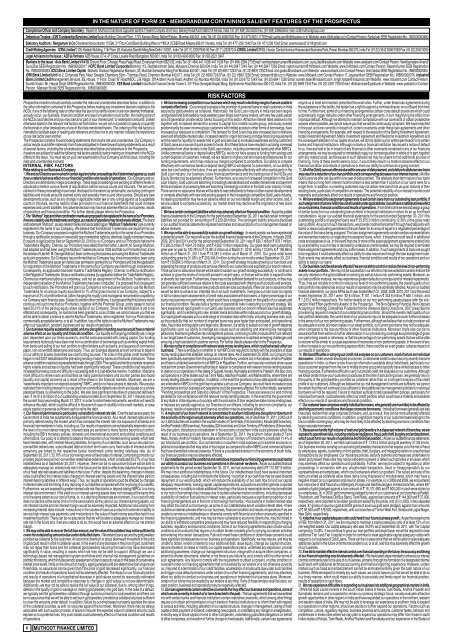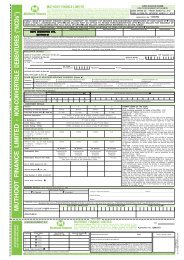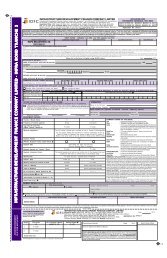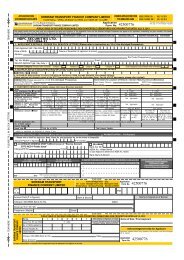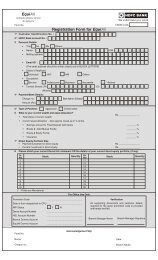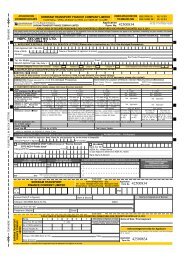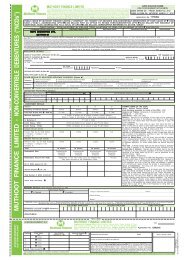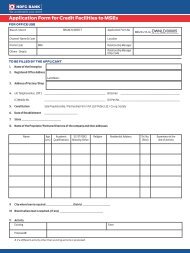NON-CONVERTIBLE
MUTHOOT FINANCE LIMITED - HDFC Bank
MUTHOOT FINANCE LIMITED - HDFC Bank
- No tags were found...
Create successful ePaper yourself
Turn your PDF publications into a flip-book with our unique Google optimized e-Paper software.
6<br />
IN THE NATURE OF FORM 2A - MEMORANDUM CONTAINING SALIENT FEATURES OF THE PROSPECTUS<br />
MUTHOOT FINANCE LIMITED<br />
Prospective investors should carefully consider the risks and uncertainties described below, in addition to<br />
the other information contained in the Prospectus before making any investment decision relating to the<br />
NCDs. If any of the following risks or other risks that are not currently known or are now deemed immaterial,<br />
actually occur, our business, financial condition and result of operation could suffer, the trading price of<br />
the NCDs could decline and you may lose all or part of your interest and / or redemption amounts. Unless<br />
otherwise stated in the relevant risk factors set forth below, we are not in a position to specify or quantify<br />
the financial or other implications of any of the risks mentioned herein. The ordering of the risk factors is<br />
intended to facilitate ease of reading and reference and does not in any manner indicate the importance<br />
of one risk factor over another.<br />
The Prospectus contains forward looking statements that involve risk and uncertainties. Our Company’s<br />
actual results could differ materially from those anticipated in these forward looking statements as a result<br />
of several factors, including the considerations described below and elsewhere in the Prospectus.<br />
Investors are advised to read the following risk factors carefully before making an investment in the NCDs<br />
offered in this Issue. You must rely on your own examination of our Company and this Issue, including the<br />
risks and uncertainties involved.<br />
INTERNAL RISK FACTORS<br />
Risks relating to our Business & Company<br />
1. We and our Directors are involved in certain legal and other proceedings that if determined against us, could<br />
have a material adverse effect on our financial condition and results of operations. : Our Company and our<br />
Directors are defendants in legal proceedings. These legal proceedings are pending at different levels of<br />
adjudication before various levels of adjudication before various courts and tribunals. The amounts<br />
claimed in these proceedings have been disclosed to the extent as certainable, excluding contingent<br />
liabilities and include amounts claimed jointly and severally from us and other parties. Should any new<br />
developments arise, such as any change in applicable Indian law or any rulings against us by appellate<br />
courts or tribunals, we may need to make provisions in our financial statements that could increase<br />
expenses and current liabilities. Any adverse decision may have an adverse effect on our business, results<br />
of operations and financial condition. For further details please refer to the Prospectus.<br />
2. The “Muthoot” logo and other combination marks are proposed to be registered in the name of our Promoters.<br />
If we are unable to use the trademarks and logos, our results of operations may be adversely affected. : The brand<br />
and trademark “Muthoot”, as also related marks and associated logos (“Muthoot Trademarks”) are currently<br />
registered in the name of our Company. We believe that the Muthoot Trademarks are important for our<br />
business. Our Company proposes to register the Muthoot Trademarks jointly in the name of our Promoters<br />
through a rectification process or irrevocably grant ownership rights by alternate, legally compliant means.<br />
Pursuant to applications filed on September 20, 2010 by our Company and our Promoters before the<br />
Trade Marks Registry, Chennai, our Promoters have stated that their father, Late Mr. M. George Muthoot,<br />
had adopted and had been using the Muthoot Trademarks since 1939 and that our Promoters had, since<br />
the demise of Late Mr. M. George Muthoot, been continuing his business and using the Muthoot Trademarks<br />
as its joint proprietors. Our Company has confirmed that our Company has, since incorporation, been using<br />
the Muthoot Trademarks as per an implied user permission granted by our Promoters and that the application<br />
for registration of the Muthoot Trademarks in the name of our Company was filed through inadvertence.<br />
Consequently, an application has been made to Trade Marks Registry, Chennai, to effect a rectification<br />
in the Register of Trademarks. Since a rectification process (by application before the Trade Marks Registry,<br />
Chennai as mentioned above) is underway, and not an assignment of the Muthoot Trademarks, no<br />
independent valuation of the Muthoot Trademarks has been conducted. It is proposed that consequent<br />
to such rectification, the Promoters will grant our Company a non-exclusive licence to use the Muthoot<br />
Trademarks for an annual royalty equivalent to 1% of the gross income of our Company, subject to a<br />
maximum of 3% of profit before tax (after charging the royalty) and managerial remuneration payable by<br />
our Company each financial year. Subject to certain other conditions, it is proposed that this licence would<br />
continue until such time that our Promoters, together with the Promoter Group, jointly cease to hold at<br />
least 50.01% of the paid-up equity share capital of our Company. Since the rectification is yet to be<br />
effected and consequently, no licence has been granted to us as of date, we cannot assure you that we<br />
will be able to obtain a licence to use the Muthoot Trademarks, when registered, from our Promoters on<br />
commercially acceptable terms, or at all. In addition, loss of the rights to use the Muthoot Trademarks may<br />
affect our reputation, goodwill, business and our results of operations.<br />
3. Our business requires substantial capital, and any disruption in funding sources would have a material<br />
adverse effect on our liquidity and financial condition. : Our liquidity and ongoing profitability are, in large<br />
part, dependent upon our timely access to, and the costs associated with, raising capital. Our funding<br />
requirements historically have been met from a combination of borrowings such as working capital limits<br />
from banks and selling of our loan portfolio to other lenders such as banks, and issuance of commercial<br />
paper, non-convertible debentures and equity. Thus, our business depends and will continue to depend<br />
on our ability to access diversified low-cost funding sources. The crisis in the global credit market that<br />
began in mid 2007 destabilised the prevailing lending model by banks and financial institutions. These<br />
adverse conditions reached unprecedented levels through 2008. The capital and lending markets remained<br />
highly volatile and access to liquidity had been significantly reduced. These conditions had resulted in<br />
increased borrowing costs and difficulty in accessing debt in a cost-effective manner. In addition, it became<br />
more difficult to renew loans and facilities as many potential lenders and counter parties also faced<br />
liquidity and capital concerns as a result of the stress in the financial markets. Moreover, we are a<br />
“systemically important non-deposit accepting” NBFC, and do not have access to deposits. We are also<br />
restricted from inviting interest in our secured non-convertible debentures which are issued on a private<br />
placement basis, by advertising to the public. We also face significant maturities of unsecured debt each<br />
year. ` 24,015.8 million of our outstanding unsecured debt as on September 30, 2011 matures during<br />
the current fiscal year ending March 31, 2012. In order to retire these instruments, we either will need to<br />
refinance this debt, which could be difficult in the event of case of volatility in the credit markets, or raise<br />
equity capital or generate sufficient cash to retire the debt.<br />
4. Our financial performance is particularly vulnerable to interest rate risk. : Over the last several years, the<br />
Government of India has substantially deregulated the financial sector. As a result, interest rates are now<br />
primarily determined by the market, which has increased the interest rate risk exposure of all banks and<br />
financial intermediaries in India, including us. Our results of operations are substantially dependent upon<br />
the level of our net interest margins. Interest rates are sensitive to many factors beyond our control,<br />
including the RBI’s monetary policies, domestic and international economic and political conditions and<br />
other factors. Our policy is to attempt to balance the proportion of our interest-earning assets, which bear<br />
fixed interest rates, with interest-bearing liabilities. A majority of our liabilities, such as our secured nonconvertible<br />
debentures, subordinated debt and short term loans carry fixed rates of interest and the<br />
remaining are linked to the respective banks’ benchmark prime lending rate/base rate. As of<br />
September 30, 2011, 55.76% of our borrowings were at fixed rates of interest, comprising primarily our<br />
privately placed secured non-convertible redeemable debentures, which constituted 29.21% of our total<br />
indebtedness as of September 30, 2011. However, there can be no assurance that we will be able to<br />
adequately manage our interest rate risk in the future and be able to effectively balance the proportion<br />
of our fixed rate loan assets and liabilities in the future. Further, despite this balancing, changes in interest<br />
rates could affect the interest rates charged on interest-earning assets and the interest rates paid on<br />
interest-bearing liabilities in different ways. Thus, our results of operations could be affected by changes<br />
in interest rates and the timing of any repricing of our liabilities compared with the re-pricing of our assets.<br />
Furthermore, we are exposed to greater interest rate risk than banks or deposit-taking NBFCs. In a rising<br />
interest rate environment, if the yield on our interest-earning assets does not increase at the same time<br />
or to the same extent as our cost of funds, or, in a declining interest rate environment, if our cost of funds<br />
does not decline at the same time or to the same extent as the yield on our interest-earning assets, our<br />
net interest income and net interest margin would be adversely impacted. Additional risks arising from<br />
increasing interest rates include: • reductions in the volume of loans as a result of customers inability to<br />
service high interest rate payments; and • reductions in the value of fixed income securities held in our<br />
investment portfolio. There can be no assurance that we will be able to adequately manage our interest<br />
rate risk in the future and, if we are unable to do so, this would have an adverse effect on our net interest<br />
margin.<br />
5. We may not be able to recover the full loan amount, and the value of the collateral may not be sufficient to<br />
cover the outstanding amounts due under defaulted loans. : We extend loans secured by gold jewellery<br />
provided as collateral by the customer. An economic downturn or sharp downward movement in the price<br />
of gold could result in a fall in collateral values. In the event of any decrease in the price of gold, customers<br />
may not repay their loans and the collateral gold jewellery securing the loans may have decreased<br />
significantly in value, resulting in losses which we may not be able to support. Although we use a<br />
technology-based risk management system and follow strict internal risk management guidelines on<br />
portfolio monitoring, which include periodic assessment of loan to security value on the basis of conservative<br />
market price levels, limits on the amount of margin, ageing analysis and pre-determined loan closure call<br />
thresholds, no assurance can be given that if the price of gold decreased significantly, our financial<br />
condition and results of operations would not be adversely affected. The impact on our financial position<br />
and results of operations of a hypothetical decrease in gold values cannot be reasonably estimated<br />
because the market and competitive response to changes in gold values is not pre-determinable.<br />
Additionally, we may not be able to realise the full value of our collateral, due to, among other things,<br />
defects in the quality of gold or wastage on melting gold jewellery into gold bars. In the case of a default,<br />
we typically sell the gold jewellery collateral through auctions primarily to local jewellers and there can<br />
be no assurance that we will be able to sell such gold jewellery provided as collateral at prices sufficient<br />
to cover the amounts under default. In addition, failure by our employees to properly appraise the value<br />
of the collateral provides us with no recourse against the borrower. Moreover, there may be delays<br />
associated with such auction process. A failure to recover the expected value of collateral security could<br />
expose us to a potential loss. Any such losses could adversely affect our financial condition and results<br />
of operations.<br />
6. We face increasing competition in our business which may result in declining margins if we are unable to<br />
compete effectively. : Our principal business is the provision of personal loans to retail customers in India<br />
secured by gold jewellery as collateral. Historically, the Gold Loan industry in India has been largely<br />
unorganised and dominated by local jewellery pawn shops and money lenders, with very few public sector<br />
and old generation private sector banks focusing on this sector. Attractive interest rates relative to risk<br />
together with increased demand for access to capital from middle income group, previously availed<br />
predominantly by lower income group customers with limited access to other forms of borrowings, have<br />
increased our exposure to competition. The demand for Gold Loans has also increased due to relatively<br />
lower and affordable interest rates, increased need for urgent borrowing or bridge financing requirements<br />
and the need for liquidity for assets held in gold and also due to increased awareness among customers<br />
of Gold Loans as a source of quick access to funds. All of these factors have resulted in us facing increased<br />
competition from other lenders in the Gold Loan industry, including commercial banks and other NBFCs.<br />
Unlike commercial banks or deposit-taking NBFCs, we do not have access to funding from savings and<br />
current deposits of customers. Instead, we are reliant on higher-cost term loans and debentures for our<br />
funding requirements, which may reduce our margins compared to competitors. Our ability to compete<br />
effectively with commercial banks or deposit-taking NBFCs will depend, to some extent, on our ability to<br />
raise low-cost funding in the future. If we are unable to compete effectively with other participants in the<br />
Gold Loan industry, our business, future financial performance and the trading price of the NCDs and<br />
Equity Shares may be adversely affected. Furthermore, as a result of increased competition in the Gold<br />
Loan industry, Gold Loans are becoming increasingly standardised and variable interest rate and payment<br />
terms and waiver of processing fees are becoming increasingly common in the Gold Loan industry in India.<br />
There can be no assurance that we will be able to react effectively to these or other market developments<br />
or compete effectively with new and existing players in the increasingly competitive Gold Loans industry.<br />
Increasing competition may have an adverse effect on our net interest margin and other income, and, if<br />
we are unable to compete successfully, our market share may decline as the origination of new loans<br />
declines.<br />
7. We have certain contingent liabilities which may adversely affect our financial condition. : As per the audited<br />
financial statements of the Company for the period ended September 30, 2011 we had certain contingent<br />
liabilities not provided for, amounting to ` 3,229.38 million. The contingent liability amounts disclosed<br />
in our audited financial statements represent estimates and assumptions of our management based on<br />
advice received.<br />
8. We may not be able to successfully sustain our growth strategy. : In recent periods, we have experienced<br />
substantial growth. Our net profit as per the audited financial statements of the Company, in fiscals 2008,<br />
2009, 2010 and 2011 and for the period ended September 30, 2011 was ` 630.7 million ` 978.7 million,<br />
` 2,285.2 million,` 4,941.76 million, and ` 4,060.1 million respectively. Our gross retail loans outstanding<br />
grew year on year by 120.78% to ` 74,381.5 million as of March 31, 2010, and by 113.34% to ` 158,684.5<br />
million as of March 31, 2011 from ` 74,381.5 million as of March 31, 2010. Our gross retail loans<br />
outstanding grew by 31.96% to ` 209,404.9 million during the six months ended September 30, 2011<br />
from ` 158,684.5 million as of March 31, 2011. Our growth strategy includes growing our loan book and<br />
expanding the range of products and services offered to our customers and expanding our branch network.<br />
There can be no assurance that we will be able to sustain our growth strategy successfully, or continue to<br />
achieve or grow the levels of net profit earned in recent years, or that we will be able to expand further<br />
or diversify our loan book. Furthermore, there may not be sufficient demand for such products, or they may<br />
not generate sufficient revenues relative to the costs associated with offering such products and services.<br />
Even if we were able to introduce new products and services successfully, there can be no assurance that<br />
we will be able to achieve our intended return on such investments. If we grow our loan book too rapidly<br />
or fail to make proper assessments of credit risks associated with borrowers, a higher percentage of our<br />
loans may become non-performing, which would have a negative impact on the quality of our assets and<br />
our financial condition. We also face a number of operational risks in executing our growth strategy. We<br />
have experienced rapid growth in our Gold Loan business and our branch network also has expanded<br />
significantly, and it is entering into new, smaller towns and cities within India as part of our growth strategy.<br />
Our rapid growth exposes us to a wide range of increased risks within India, including business risks, such<br />
as the possibility that our number of impaired loans may grow faster than anticipated, and operational<br />
risks, fraud risks and regulatory and legal risks. Moreover, our ability to sustain our rate of growth depends<br />
significantly upon our ability to manage key issues such as selecting and retaining key managerial<br />
personnel, maintaining effective risk management policies, continuing to offer products which are relevant<br />
to our target base of customers, developing managerial experience to address emerging challenges and<br />
ensuring a high standard of customer service. For further details please refer to the Prospectus.<br />
9. We may not be in compliance with relevant state money lending laws, which could adversely affect our<br />
business. : There is ambiguity on whether or not NBFCs are required to comply with the provisions of state<br />
money lending laws that establish ceilings on interest rates. As of September 20, 2009, our Company has<br />
been specifically exempted from the provisions of the Money Lenders Act in Karnataka, Andhra Pradesh<br />
and there is a blanket exemption for all NBFCs in Rajasthan. Further, we have also received show cause<br />
notices from certain Government authorities in relation to compliance with relevant money lending statutes<br />
in relation to our operations in the states of Gujarat, Kerala, Karnataka and Andhra Pradesh. We also carry<br />
out operations in other states such as Tamil Nadu, Madhya Pradesh, and Maharashtra, where there are<br />
money lending statutes in operation. In addition, in the event the provisions of any state specific regulations<br />
are extended to NBFCs in the gold loan business such as our Company, we could have increased costs<br />
of compliance and our business and operations could be adversely affected. For further details, see section<br />
“Pending proceedings and Statutory Defaults” of the Prospectus. There are severe civil and criminal<br />
penalties for non-compliance with the relevant money lending statutes. In the event that the government<br />
of any state in India requires us to comply with the provisions of their respective state money lending laws,<br />
or imposes any penalty against us, our Directors or our officers, including for prior non-compliance, our<br />
business, results of operations and financial condition may be adversely affected.<br />
10. A major part of our branch network is concentrated in southern India and any disruption or downturn in<br />
the economy of the region would adversely affect our operations. : As of December 31, 2011, 2,242 out of<br />
our 3,480 branches are located in the southern states of Tamil Nadu (744 branches), Kerala (683 branches),<br />
Andhra Pradesh (483 branches), Karnataka (324 branches) and Union Territory of Pondicherry (8 branches).<br />
Any disruption, disturbance or breakdown in the economy of southern India could adversely affect the<br />
result of our business and operations. As of September 30, 2011, the southern Indian states of Tamil<br />
Nadu, Kerala, Andhra Pradesh, Karnataka and the Union Territory of Pondicherry constituted 71.4% of<br />
our total Gold Loan portfolio. Our concentration in southern India exposes us to adverse economic or<br />
political circumstances that may arise in that region as compared to other NBFCs and commercial banks<br />
that have diversified national presence. If there is a sustained downturn in the economy of south India,<br />
our financial position may be adversely affected.<br />
11. Our indebtedness and the conditions and restrictions imposed by our financing agreements could restrict<br />
our ability to conduct our business and operations in the manner we desire. : As per our audited financial<br />
statements for the period ended September 30, 2011, we had outstanding debt of ` 172,567.9 million.<br />
We may incur additional indebtedness in the future. Our indebtedness could have several important<br />
consequences, including but not limited to the following: • a portion of our cash flow may be used towards<br />
repayment of our existing debt, which will reduce the availability of our cash flow to fund our capital<br />
adequacy requirements, working capital, capital expenditures, acquisitions and other general corporate<br />
requirements; • our ability to obtain additional financing in the future at reasonable terms may be restricted<br />
or our cost of borrowings may increase due to sudden adverse market conditions, including decreased<br />
availability of credit or fluctuations in interest rates, particularly because a significant proportion of our<br />
financing arrangements are in the form of borrowings from banks.; • fluctuations in market interest rates<br />
may affect the cost of our borrowings, as some of our indebtedness are at variable interest rates; • there<br />
could be a material adverse effect on our business, financial condition and results of operations if we are<br />
unable to service our indebtedness or otherwise comply with financial and other covenants specified in<br />
the financing agreements; and • we may be more vulnerable to economic downturns, may be limited in<br />
our ability to withstand competitive pressures and may have reduced flexibility in responding to changing<br />
business, regulatory and economic conditions. Some of our financing agreements also include various<br />
conditions and covenants that require us to obtain lender consents prior to carrying out certain activities<br />
and entering into certain transactions. Failure to meet these conditions or obtain these consents could<br />
have significant consequences on our business and operations. Specifically, we may require, and may be<br />
unable to obtain, lender consents to incur additional debt, issue equity, change our capital structure,<br />
declare dividend, increase or modify our capital expenditure plans, undertake any expansion, provide<br />
additional guarantees, change our management structure, merge with or acquire other companies, or<br />
amend its charter documents, whether or not there is any failure by us to comply with the other terms of<br />
such agreements. Any failure to comply with the requirement to obtain a consent, or other condition or<br />
covenant under our financing agreements that is not waived by our lenders or is not otherwise cured by<br />
us, may lead to a termination of our credit facilities, acceleration of all amounts due under such facilities<br />
and trigger cross default provisions under certain of our other financing agreements, and may adversely<br />
affect our ability to conduct our business and operations or implement our business plans. Moreover,<br />
certain of our loans may be recalled by our lenders at any time. If any of these lenders recall its loans, our<br />
cash position, business and operations may be negatively affected.<br />
12. Our loan agreements contain restrictive covenants that may affect our business and operations, some of<br />
which we are currently in breach of or have breached in the past. : The loan agreements that we have entered<br />
into with certain banks and financial institutions contain restrictive covenants, which among other things<br />
require us to obtain prior permission of such banks or financial institutions or to inform them with respect<br />
to various activities, including, alteration of our capital structure, changes in management, raising of fresh<br />
capital or debt, payment of dividend, undertaking new projects, or undertaking any merger or amalgamation,<br />
invest by way of share capital or lend to other companies, undertaking guarantee obligations on behalf<br />
of other companies, and creation of further charge on fixed assets. Additionally, certain loan agreements<br />
require us to meet and maintain prescribed financial ratios. Further, under these loan agreements during<br />
the subsistence of the facility, the lender has a right to appoint a nominee director on our Board from time<br />
to time. Further more, some of our financing arrangements contain cross default provisions which could<br />
automatically trigger defaults under other financing arrangements, in turn magnifying the effect of an<br />
individual default. Although we attempt to maintain compliance with our covenants or obtain prospective<br />
waivers where possible, we cannot assure you that we will be continuously compliant. We have breached<br />
in the past, and are currently in breach of, certain covenants under these loan agreements and other<br />
financing arrangements. For example, with respect to the execution of the Baring Investment Agreement,<br />
Kotak Investment Agreement, Matrix Investment Agreement and Wellcome Investment Agreement and<br />
the consequent alteration of our capital structure, we did not obtain a prior written permission from certain<br />
banks and financial institutions. Although no bank or financial institution has issued a notice of default<br />
to us, if we are held to be in breach of any financial or other covenants contained in any of our financing<br />
arrangements, we may be required to immediately repay our borrowings either in whole or in part, together<br />
with any related costs, and because of such defaults we may be unable to find additional sources of<br />
financing. If any of these events were to occur, it would likely result in a material adverse effect on our<br />
financial condition and results of operations or even our ability to continue as a going concern.<br />
13. All of the Gold Loans we offer are due within one year of disbursement, and a failure to disburse new loans<br />
may result in a reduction of our loan portfolio and a corresponding decrease in our interest income. : All of the<br />
Gold Loans we offer are due within one year of disbursement. The relatively short-term nature of our loans<br />
means that our long-term interest income stream is less certain than if a portion of our loans were for a<br />
longer term. In addition, our existing customers may not obtain new loans from us upon maturity of their<br />
existing loans, particularly if competition increases. The potential instability of our interest income could<br />
materially and adversely affect our results of operations and financial position.<br />
14. We have entered into assignment agreements to sell certain loans from our outstanding loan portfolio. If<br />
such assignment of loans is held to be unenforceable under applicable law, it could have a material adverse effect<br />
on our business, financial condition and results of operations. : From time to time we sell and assign a group<br />
of similar loans from our outstanding loan portfolio to financial institutions in return for an up front fixed<br />
consideration. As per our audited financial statements for the period ended September 30, 2011 the<br />
outstanding portfolio of assigned loans was ` 25,875.0 million constituting 12.36% of the gross retail<br />
loan portfolio. As a part of such transactions, we provide credit enhancement through fixed deposits with<br />
banks or issue corporate guarantees to the purchaser for an amount equal to a negotiated percentage of<br />
the value of the loans being assigned. The loan assignment agreements contain certain representations<br />
and warranties made by us regarding the assigned loans, which, if breached could result in additional<br />
costs and expenses to us. In the event that one or more of the asset assignment agreements entered into<br />
by us are held by a court of law or declared by a statute as unenforceable, we may be required to terminate<br />
these assignment agreements and may suffer losses. In addition, if such assignments of loans are sought<br />
to be regulated, it could adversely affect our ability to raise resources through the loan assignment route.<br />
Such events may adversely affect our business, financial condition and results of our operations and our<br />
ability to assign our loans.<br />
15. Our business could be adversely affected if we are not able to control or reduce the level of non-performing<br />
assets in our portfolio. : We may not be successful in our efforts to improve collections and/or enforce the<br />
security interest on the gold collateral on existing as well as future non-performing assets. Moreover, as<br />
our loan portfolio matures, we may experience greater defaults in principal and/or interest repayments.<br />
Thus, if we are not able to control or reduce our level of non-performing assets, the overall quality of our<br />
loan portfolio may deteriorate and our results of operations may be adversely affected. As per our audited<br />
financial statements, our gross NPAs as of year ended March 31, 2008, 2009, 2010, 2011 and the period<br />
ended September 30, 2011 were` 92.6 million, ` 161.1 million ` 343.6 million,` 460.1 million, and<br />
` 1,233.2 million respectively. For further details on our non-performing assets please refer the subsection<br />
titled `Non-performing Assets’ of the Prospectus.. The Non-Banking Financial (Non-Deposit<br />
Accepting or Holding) Companies Prudential Norms (Reserve Bank) Directions, 2007 prescribe the<br />
provisioning required in respect of our outstanding loan portfolio. Should the overall credit quality of our<br />
loan portfolio deteriorate, the current level of our provisions may not be adequate to cover further increases<br />
in the amount of our non-performing assets. Furthermore, although we believe that our total provision will<br />
be adequate to cover all known losses in our asset portfolio, our current provisions may not be adequate<br />
when compared to the loan portfolios of other financial institutions. Moreover, there also can be no<br />
assurance that there will be no further deterioration in our provisioning coverage as a percentage of gross<br />
non-performing assets or otherwise, or that the percentage of non-performing assets that we will be able<br />
to recover will be similar to our past experience of recoveries of non-performing assets. In the event of any<br />
further increase in our non-performing asset portfolio, there could be an even greater, adverse impact on<br />
our results of operations.<br />
16. We face difficulties in carrying out credit risk analyses on our customers, most of whom are individual<br />
borrowers : Unlike several developed economies, a nationwide credit bureau has only recently become<br />
operational in India, so there is less financial information available about individuals, particularly our<br />
focus customer segment from the low to middle income group who typically have limited access to other<br />
financing sources. It is therefore difficult to carry out precise credit risk analyses on our customers. Although<br />
we follow certain know-your-customer procedures at the time of sanctioning a loan, we generally rely on<br />
the quality of the gold jewellery provided as collateral rather than on a stringent analysis of the credit<br />
profile of our customers. Although we believe that our risk management controls are sufficient, we cannot<br />
be certain that they will continue to be sufficient or that additional risk management policies for individual<br />
borrowers will not be required. Failure to maintain sufficient credit assessment policies, particularly for<br />
individual borrowers, could adversely affect our credit portfolio which could have a material and adverse<br />
effect on our results of operations and financial condition.<br />
17. Our customer base comprises mostly individual borrowers, who generally are more likely to be affected by<br />
declining economic conditions than large corporate borrowers. : Individual borrowers generally are less<br />
financially resilient than large corporate borrowers, and, as a result, they can be more adversely affected<br />
by declining economic conditions. In addition, a significant majority of our customer base belongs to the<br />
low to middle income group, who may be more likely to be affected by declining economic conditions than<br />
large corporate borrowers.<br />
18. Because we handle high volume of cash and gold jewellery in a dispersed network of branches, we are<br />
exposed to operational risks, including employee negligence, fraud, petty theft, burglary and embezzlement,<br />
which could harm our results of operations and financial position. : As per our audited financial statements,<br />
as of September 30, 2011, we held cash balance of ` 1,134.5 million and gold jewellery of 129.5 tons.<br />
Our business involves carrying out cash and gold jewellery transactions that expose us to the risk of fraud<br />
by employees, agents, customers or third parties, theft, burglary, and misappropriation or unauthorised<br />
transactions by our employees. Our insurance policies, security systems and measures undertaken to<br />
detect and prevent these risks may not be sufficient to prevent or detect such activities in all cases, which<br />
may adversely affect our operations and profitability. Further, we may be subject to regulatory or other<br />
proceedings in connection with any unauthorised transaction, fraud or misappropriation by our<br />
representatives and employees, which could adversely affect our goodwill. The nature and size of the<br />
items provided as collateral allow these items to be misplaced or mis-delivered, which may have a<br />
negative impact on our operations and result in losses. For example, (i) in 2008 and 2009, we encountered<br />
two instances of staff fraud at our Millerganj, Punjab and Sakthikulangara, Kerala branches, where 497<br />
packets of gold (pledged against a loan amount of ` 16,127,480) and ` 500,000 in cash were stolen by<br />
our employees, (ii) in 2009, gold ornaments pledged by two of our customers at our branches at Pettah,<br />
Trivandrum, and Thenkassi Old Bus Stand, Tamil Nadu, against loan amounts of ` 144,000 and ` 27,000,<br />
respectively, were reported to be stolen goods and seized by the police, and (iii) in 2009, in two separate<br />
cases, 87 grams of spurious gold and 604 grams of spurious gold were pledged, against loan amounts<br />
of ` 93,500 and` 578,500, respectively, with our branches at Trichur West Fort, Kerala and Lajpat Nagar,<br />
New Delhi, respectively.<br />
19. A decline in our capital adequacy ratio could restrict our future business growth. : As per the revised norms<br />
of RBI, from March 31, 2011, we are required to maintain a capital adequacy ratio of at least 15% of our<br />
risk-weighted assets. Our capital adequacy ratio was 18.24% as of September 30, 2011, with Tier I capital<br />
comprising 13.48%. If we continue to grow our loan portfolio and asset base, we will be required to raise<br />
additional Tier I and Tier II capital in order to continue to meet applicable capital adequacy ratios with<br />
respect to our business of Gold Loans. There can be no assurance that we will be able to raise adequate<br />
additional capital in the future on terms favourable to us, or at all, and this may adversely affect the growth<br />
of our business.<br />
20. If we fail to maintain effective internal control over financial reporting in the future, the accuracy and timing<br />
of our financial reporting may be adversely affected. : We have taken steps intended to enhance our internal<br />
controls commensurate to the size of our business, primarily through the formation of a designated internal<br />
audit team with additional technical accounting and financial reporting experience. However, certain<br />
matters such as fraud and embezzlement cannot be eliminated entirely given the cash nature of our<br />
business. While we expect to remedy any such issues, we cannot assure you that we will be able to do so<br />
in a timely manner, which could impair our ability to accurately and timely report our financial position,<br />
results of operations or cash flows.<br />
21. We may experience difficulties in expanding our business into additional geographical markets in India.<br />
: While the Gold Loans markets in the South Indian States of Kerala Tamil Nadu, Andhra Pradesh and<br />
Karnataka remains and is expected to remain our primary strategic focus, we also evaluate attractive<br />
growth opportunities in other regions in India and have expanded our operations in the northern, western<br />
and eastern states of India. We may not be able to leverage our experience in southern India to expand<br />
our operations in other regions, should we decide to further expand our operations. Factors such as<br />
competition, culture, regulatory regimes, business practices and customs, customer tastes, behavior and<br />
preferences in these cities where we may plan to expand our operations may differ from those in south<br />
Indian states of Kerala, Tamil Nadu, Andhra Pradesh and Karnataka and our experience in the States of<br />
RISK FACTORS<br />
Compliance Officer and Company Secretary : Rajesh A. Muthoot Chambers Opposite Saritha Theatre Complex 2nd Floor, Banerji Road Kochi 682 018 Kerala, India Tel: (91 484) 353 5533 Fax: (91 484) 2396506 E-mail: cs@muthootgroup.com<br />
Debenture Trustee : IDBI Trusteeship Services Limited Asian Building, Ground Floor, 17 R. Kamani Marg, Ballard Estate, Mumbai 400 001, India Tel: (91 22) 40807000 Fax: (91 477) 6631 1776 Email: sarita.iyer@idbitrustee.co.in Website: www.idbitrustee.co.in Contact Person: Sarita Iyer SEBI Registration No. : IND000000460<br />
Statutory Auditors : Rangamani & Co Chartered Accountants 17/598, 2 nd Floor Card Bank Building West of YMCA VCSB Road Allepey 688 011 Kerala, India Tel: (91 477) 226 1542 Fax: (91 477) 226 1542 Email: sreenivasan2121@gmail.com<br />
Credit Rating Agencies : ICRA Limited 1105, Kailash Building, 11th Floor 26, Kasturba Gandhi Marg New Delhi 110001, India Tel: (9111) 23357940-50 Fax: (9111) 23357014 CRISIL Limited CRISIL House, Central Avenue Hiranandani Business Park, Powai Mumbai 400 076, India Tel: (91 22) 3342 3000/1952 Fax: (91 22) 3342 3050<br />
Legal Advisors to the Issue : AZB & Partners AZB House, 67-4, 4 th Cross, Lavelle Road Bangalore 560 001, India Tel: (91 80) 4240 0500 Fax: (91 80) 2221 3947<br />
Bankers to the Issue : Axis Bank Limited 41/419, Ground Floor, Chicago Plaza Rajaji Road, Ernakulam Kochi 682 035, India Tel: (91 484) 4411 008/ 4411 039 Fax: (91 484) 2384 273 Email: venkitachalam.anand@axisbank.com, suraj.das@axisbank.com Website: www.axisbank.com Contact Person: Venkitachalam Anand/<br />
Suraj Das SEBI Registration No.: INBI00000017. HDFC Bank Limited Corporate Banking 115, Radhakrishnan Salai, Mylapore Chennai 600 004, India Tel: (91 44) 2847 7243 Fax: (91 44) 2847 7250 Email: rajesh.kumarm@hdfcbank.com Website: www.hdfcbank.com Contact Person: Rajesh Kumar SEBI Registration<br />
No.: INBI00000063. ICICI Bank Limited Capital Markets Division Rajbahadur Mansion, 30, Mumbai Samachar Marg Fort Mumbai 400 001, India Tel: (91 22) 6631 7243 Fax: (91 22) 6631 7250 Email: anil.gadoo@icicibank.com Website: www.icicibank.com Contact Person: Anil Gadoo SEBI Registration No.: INBI00000004.<br />
IDBI Bank Limited Unit No.2, Corporate Park, Near Swastik Chambers Sion –Trombay Road, Chembur Mumbai 400 071, India Tel: (91 22) 6690 7243 Fax: (91 22) 6690 7250 Email: ipoteam@idbi.co.in Website: www.idbibank.com Contact Person: V. Jayananthan SEBI Registration No.: INBI00000076. IndusInd<br />
Bank Limited Cash Management services, IBL House, 1 st Floor, Cross “B” Road MIDC, J.B. Nagar, Off Andheri Kurla Road, Andheri (E) Mumbai 400 059, India Tel: (91 22) 6772 7243 Fax: (91 22) 6641 7250 Email: suresh.esaki@indusind.com, singh.harpal@indusind.com Website: www.indusind.com Contact Person:<br />
Suresh Esaki / Mr. Harpal Singh SEBI Registration No.: INBI00000002. YES Bank Limited India Bulls Finance Center Tower II, 23 rd Floor Senapati Bapat Marg, Elphinstone Road Mumbai 400 013, India Tel : (91 22) 6669 7243 Fax: (91 22) 2497 7250 Email: dlbtiservices@yesbank.in Website: www.yesbank.in Contact<br />
Person : Mahesh Shirali SEBI Registration No.: INBI00000935


